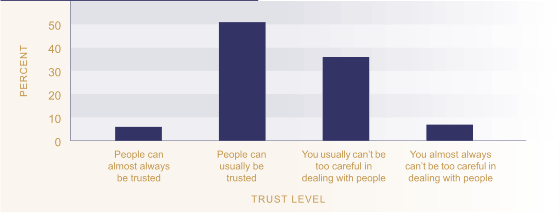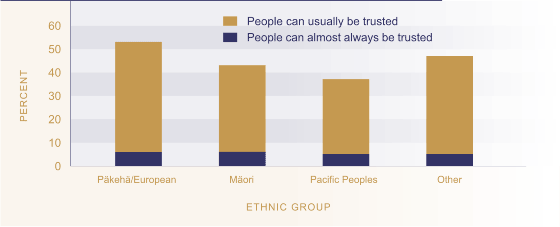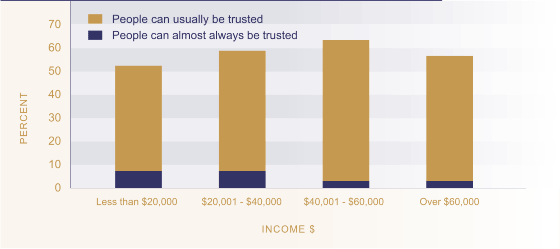Relevance
Trust in others is an important indicator of how people feel about members of their community. High levels of trust facilitate co-operative behaviour among people and contribute to people's ability to develop positive relationships with others.
Current Level
Results from the Social Wellbeing Survey 2004 show that over one-half (57 percent) of New Zealanders believe that people can be trusted, with six percent reporting that 'people can almost always be trusted' and 51 percent reporting that 'people can usually be trusted'.
Figure SC3.1 Levels of trust in other
people, 2004

Source: Ministry of Social
Development (2004)
Sex Differences
Males (60 percent) are more likely than females (54 percent) to report that people can be trusted. Both sexes have the same proportion of supporters (6 percent) for the statement 'people can almost always be trusted', but a higher proportion of men (54 percent) than women (48 percent) indicated that 'people can usually be trusted'.
There are only minor age differences concerning trust in others. Across all age groups over 50 percent of New Zealanders report that people can 'usually' or 'almost always' be trusted.
Ethnic Differences
Pakeha/Europeans showed the highest overall level of trust in others with 59 percent responding that people could 'almost always' or 'usually' be trusted. Māori and Pacific people are more cautious, with only 49 percent of Māori and 42 percent of Pacific people reporting that people could be trusted. Fifty-three percent of people in other ethnic groups (including Asians) indicated that they thought that people could 'almost always' or 'usually' be trusted.
Figure SC3.2 Proportion of respondents
reporting that people can 'almost always' or 'usually' be trusted, by
ethnic group, 2004

Source: Ministry of Social
Development (2004)
Personal Income Differences
Across all income levels a majority of New Zealanders indicated that people could 'almost always' or 'usually' be trusted. New Zealanders with personal incomes between $40,001-60,000 reported the highest overall levels of trust. Those with incomes $20,000 or less reported lower levels of trust overall, with only 52 percent indicating that they thought people could be trusted 'almost always' or 'usually'.
Figure SC3.3 Proportion of respondents
reporting that people can 'almost always' or 'usually' be trusted, by
personal income, 2004

Source: Ministry of Social
Development (2004)
International Comparison
In 1998, 49 percent of New Zealanders said that most people can be trusted. This was high compared to an OECD median of 38 percent in 1995/1996. New Zealand ranked sixth out of 26 OECD countries. Norway had the best outcome in the OECD, with 65 percent of Norwegians stating that most people can be trusted. Outcomes for other countries include Canada (sixth, 52 percent), Australia (13th, 40 percent), the United States (14th, 36 percent), and the United Kingdom (18th, 31 percent).
